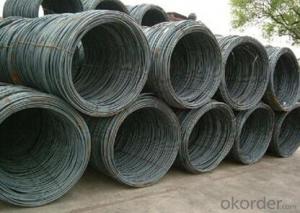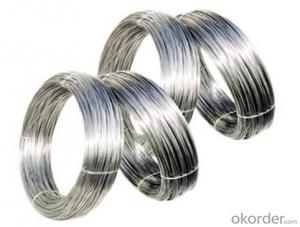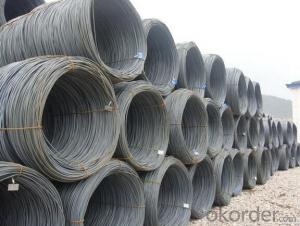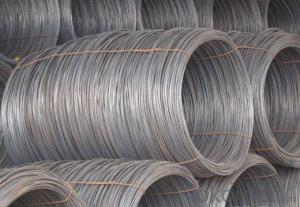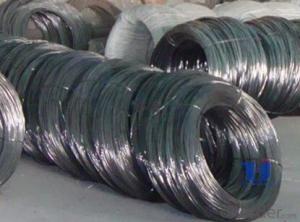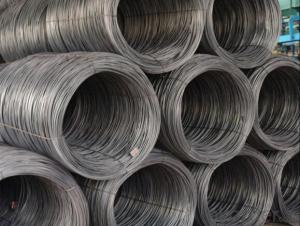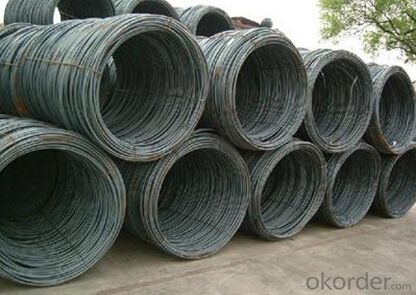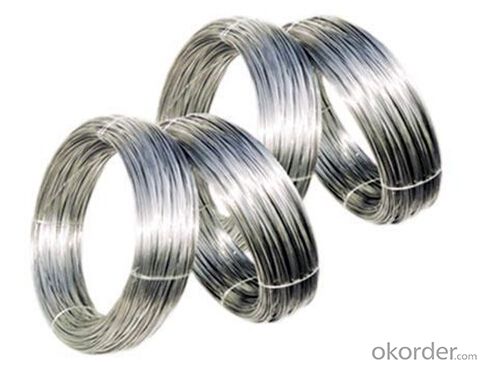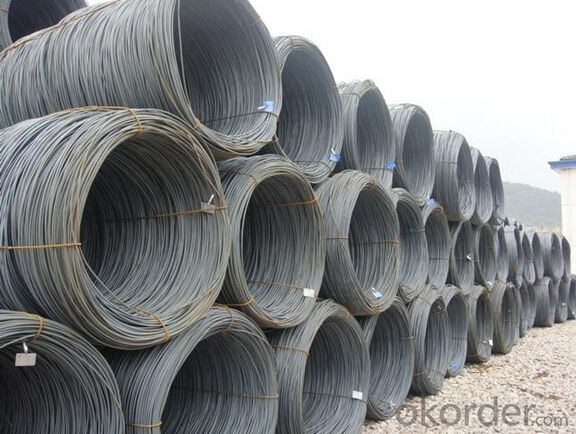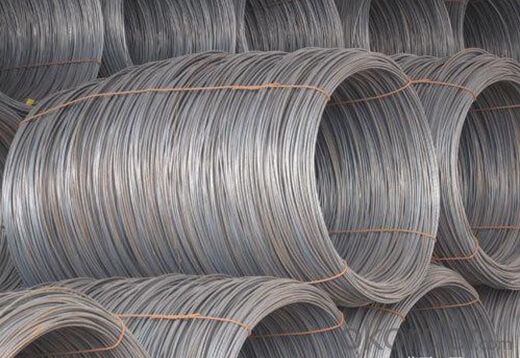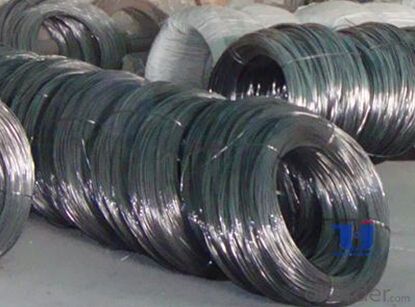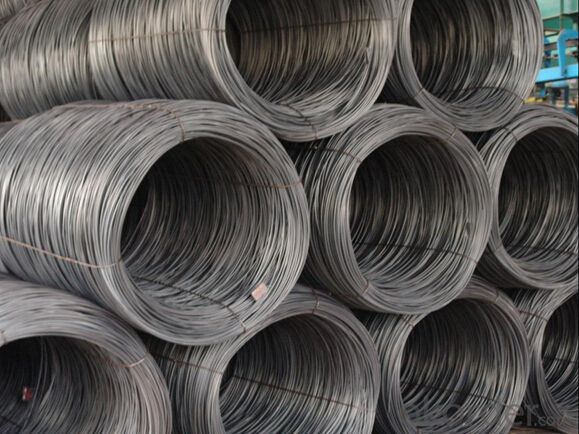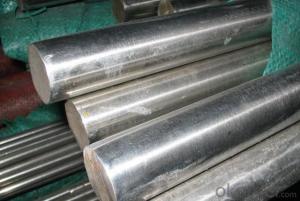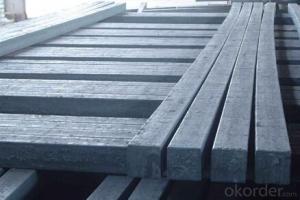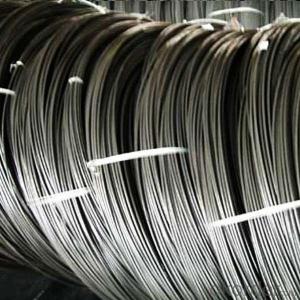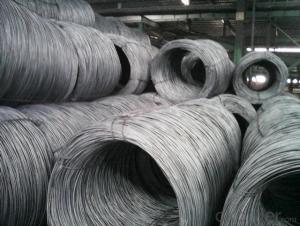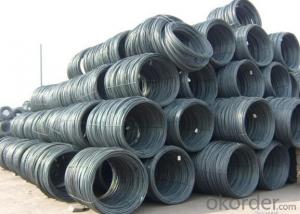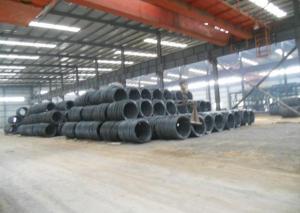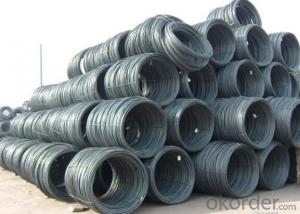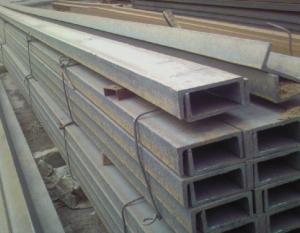Grade Q235 Hot Rolled Steel Wire Rod in Coils
- Loading Port:
- Tianjin
- Payment Terms:
- TT OR LC
- Min Order Qty:
- 3 m.t.
- Supply Capability:
- 10000 m.t./month
OKorder Service Pledge
Quality Product, Order Online Tracking, Timely Delivery
OKorder Financial Service
Credit Rating, Credit Services, Credit Purchasing
You Might Also Like
Specification
Type:
Carbon Steel,Spring Steel,Bearing Steel,Gear Steel,Deformed Steel,Stainless Steel,Alloy Steel
Shape:
Steel Coil,Steel Sheet,Steel Wire Rod,Steel Flat Bar,Steel Square Bar,Steel Angle,Steel Round Bar,Steel Billets
Technique:
Hot Rolled,Cold Rolled,Cold Drawn,ERW,Forged,Saw,Extruded,EFW,Spring
Surface Treatment:
Galvanized,Coated,Copper Coated,Color Coated,Oiled,Dry,Chromed Passivation,Polished,Bright,Black,PVDF Coated
Certification:
ISO,SGS,BV,IBR,RoHS,CE,API,BSI,UL
Thickness:
5.5mm, 6.5mm, 8-14mm
Width:
5.5mm, 6.5mm, 8-14mm
Length:
In coils
Outer Diameter:
5.5mm, 6.5mm, 8-14mm
Net Weight:
2m.t.
Packaging:
Seaworthy packaging
Grade Q235 Hot Rolled Steel Wire Rod in Coils
Detailed Information of the Grade Q235 Hot Rolled Steel Wire Rod in Coils
| Name | Hot Rolled High Carbon Wire Rod |
| Shape | Round Bar/Square Bar/Flat Bar/Plate/Wire |
| Standard | GB/ASTM/SAE/AISI/DIN/JIS/EN/BS |
| Surface Treatment: | Black/Peeling/Polished/Machined |
| Delivery Condition: | Hot Rolled or Forged/Peeled or Black Surface |
| Test | SGS/UT 100% Elements Testing |
| Certificate: | ISO/Mill Certificate |
| Service: | 24 hours online service / |
| more than 20 years trading and manufacture | |
| Quality Assurance: | the third party inspection, such as SGS, BV, TUV…etc. is acceptable |
| Packaging Details: | Seaworthy Packaging or as per customer's packing instruction |
Chemical Composition of the Grade Q235 Hot Rolled Steel Wire Rod in Coils
| Grade | Chemical Composition(%) | |||||
| C | Mn | Si | S | P | B | |
| SAE1008 | 0.1max. | 0.3~0.50 | 0.15max | 0.050max | ≤0.040 | >0.0008 |
| Mechanical properties | ||||||
| Yield strength(N/mm2) | Tensile strength(N/mm2) | Elongation(%) | ||||
| 250-280 | 350-380 | ≥32 | ||||
Company Introduction the Grade Q235 Hot Rolled Steel Wire Rod in Coils
CNBM International Corporation is the most import and export platform of CNBM group(China National Building Material Group Corporation) ,which is a state-owned enterprise, ranked in 270th of Fortune Global 500 in 2015.
With its advantages, CNBM International are mainly concentrate on Cement, Glass, Iron and Steel, Ceramics industries and devotes herself for supplying high quality series of refractories as well as technical consultancies and logistics solution.
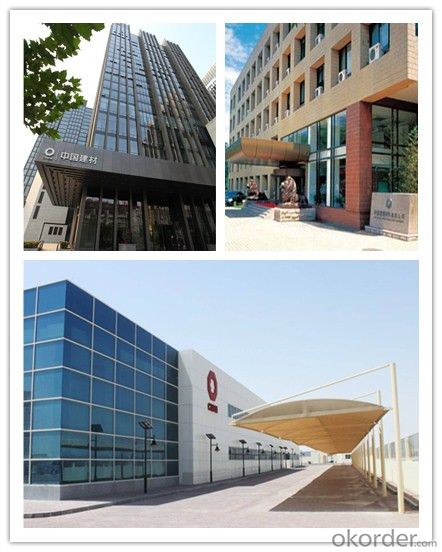
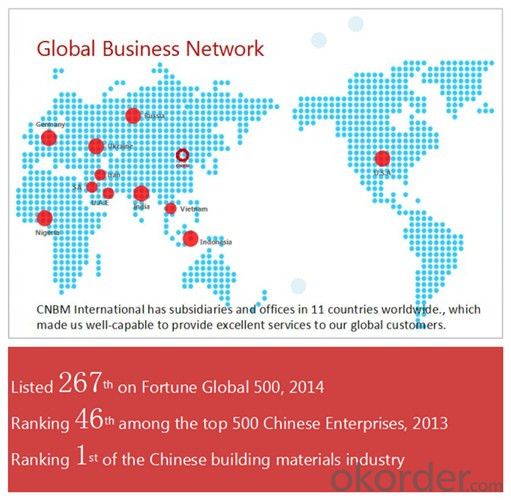
| After-sale service | CNBM provides the services and support you need for every step of our cooperation. We’re the business partners you can trust; you can relax and get on with doing business. |
| For any problem, please kindly contact us at any your convenient time, we’ll reply you in our first priority within 24 hours | |
| Advantages | Industry experience over 20 years. |
| Shipment of goods -More than 70 countries worldwide. | |
| The most convenient transport and prompt delivery. | |
| Competitive price with best service. | |
| High technical production line with top quality products. | |
| High reputation based on best quality products. |
Packaging & Delivery the Grade Q235 Hot Rolled Steel Wire Rod in Coils
| Packaging Detail | Sea worthy packing /as per customer's packing instruction |
| Delivery Detail | 15 ~ 40 days after receiving the deposit |
Products Show
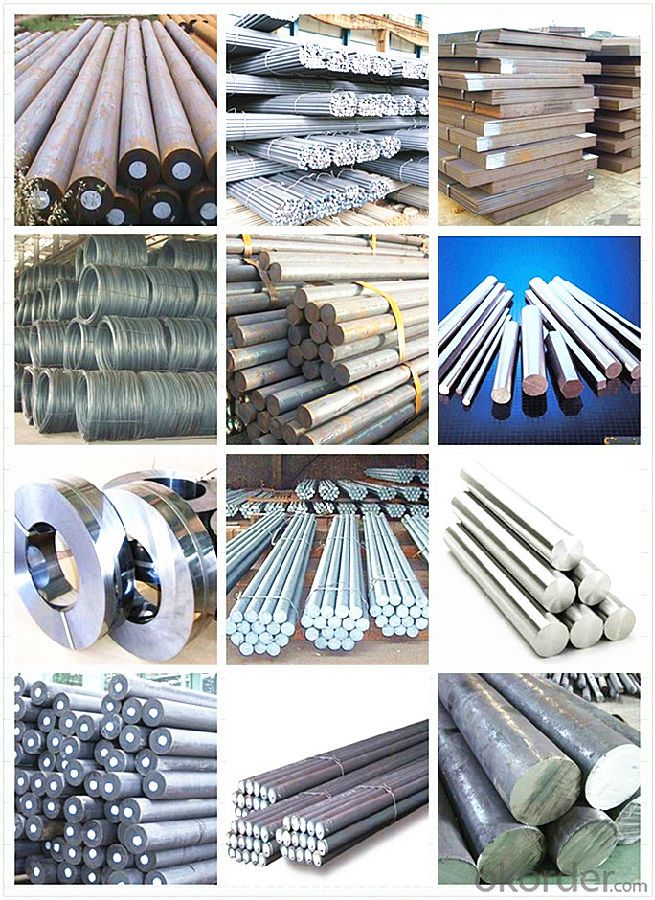
FAQ:
| Are you a trader or manufacturer? | Manufacturer |
| What’s the MOQ? | 3 metric ton |
| What’s your delivery time? | 15-35 days after downpayment received |
| Do you Accept OEM service? | Yes |
| what’s your delivery terms? | FOB/CFR/CIF |
| What's the Payment Terms? | 30% as deposit,70% before shipment by T/T |
| Western Union acceptable for small amount. | |
| L/C acceptable for large amount. | |
| Scrow ,Paybal,Alipay are also ok | |
| Why choose us? | Chose happens because of quality, then price, We can give you both. |
| Additionally, we can also offer professional products inquiry, products knowledge train (for agents), smooth goods delivery, excellent customer solution proposals. | |
| What's your available port of Shipment? | Main Port, China |
| What’s your featured services? | Our service formula: good quality+ good price+ good service=customer's trust |
| Where are your Market? | Covering more than 160 countries in the world |
- Q: What are the different surface modification techniques used for special steel?
- There are several surface modification techniques used for special steel to enhance its properties and improve its performance in specific applications. Some of the common techniques include: 1. Nitriding: Nitriding is a surface hardening process that involves the diffusion of nitrogen into the steel surface. It forms a hard layer of nitrides, which significantly increases the surface hardness, wear resistance, and fatigue strength of the steel. 2. Carbonitriding: Carbonitriding is a similar process to nitriding, but it involves the diffusion of both carbon and nitrogen into the steel surface. This technique increases the surface hardness and also improves the wear resistance and fatigue strength of the steel. 3. Case hardening: Case hardening involves the addition of a hard, wear-resistant layer to the surface of the steel. This can be achieved through processes like carburizing or carbonitriding, where carbon is introduced into the surface layer, transforming it into a high-carbon martensitic layer. 4. Shot peening: Shot peening is a technique that involves bombarding the steel surface with small, high-velocity shots of media, such as steel, ceramic, or glass beads. This process induces compressive stresses on the surface, improving its fatigue strength and resistance to stress corrosion cracking. 5. Electroplating: Electroplating is a common technique used to apply a thin layer of metal coating onto the steel surface. This can be done with various metals like zinc, nickel, or chromium, providing protection against corrosion, improving aesthetics, and enhancing wear resistance. 6. Physical vapor deposition (PVD): PVD is a coating technique that involves depositing thin layers of material onto the steel surface through a vacuum process. This technique can be used to apply coatings like titanium nitride (TiN), which provides excellent wear resistance and reduces friction. 7. Laser surface modification: Laser surface modification techniques, such as laser hardening or laser alloying, use a high-energy laser beam to selectively heat and modify the steel surface. This process can improve hardness, wear resistance, and corrosion resistance. These surface modification techniques can be tailored to meet specific requirements, enhancing the properties of special steel for various applications in industries such as automotive, aerospace, and tooling.
- Q: What are the properties of carbon steel?
- Carbon steel is a type of steel that primarily consists of iron and carbon. It is known for its high strength, durability, and relatively low cost compared to other materials. Carbon steel is also highly resistant to corrosion and can withstand high temperatures. It can be easily shaped and welded, making it a versatile material for various applications in industries such as construction, automotive, and manufacturing.
- Q: What are the disadvantages of using special steel?
- One disadvantage of using special steel is its higher cost compared to regular steel. Special steel typically requires additional alloying elements and manufacturing processes, making it more expensive to produce. Additionally, special steel may have limited availability and require specialized knowledge and equipment for fabrication and handling.
- Q: How does special steel contribute to the agricultural sector?
- The agricultural sector benefits greatly from the use of special steel in multiple ways. Firstly, special steel's strength and durability make it an ideal material for manufacturing various agricultural machinery and equipment. Tractors, plows, harvesters, and irrigation systems, among others, all require sturdy and reliable components. Special steel provides the necessary strength and resistance to wear and tear, enabling these machines to withstand the demanding conditions of agricultural work. In addition, special steel is perfect for producing high-quality cutting tools that are essential in farming operations. Sickles, scythes, and pruning shears, for example, need to have sharp and durable blades for efficient vegetation cutting. Special steel's hardness and strength make it a suitable material for manufacturing such tools, ensuring they maintain their sharpness even with prolonged use. Moreover, special steel contributes to the agricultural sector by enabling the construction of strong and durable infrastructure. Agricultural buildings, storage facilities, and fencing often require materials that can withstand the elements and protect crops, livestock, and equipment. Special steel, with its resistance to rust and structural integrity, can be used in the construction of barns, silos, sheds, and fencing, providing long-lasting and reliable structures. In summary, special steel plays a vital role in the agricultural sector by providing the necessary strength, durability, and corrosion resistance for the manufacturing of machinery, cutting tools, and infrastructure. These properties enhance efficiency, productivity, and reliability in agricultural operations, ultimately benefiting farmers and the overall agricultural industry.
- Q: What are the different mechanical properties of special steel?
- Special steels exhibit a diverse array of mechanical characteristics that render them distinctive and well-suited for specific uses. Among the noteworthy mechanical properties of special steel are its exceptional strength, impressive toughness, commendable wear resistance, and superior corrosion resistance. Of all these properties, high strength emerges as a particularly crucial attribute of special steel. This inherent strength enables the material to withstand substantial loads and stress without succumbing to deformation or failure. As a result, special steel finds application in areas where the preservation of structural integrity and durability holds paramount importance, such as in the construction of buildings, bridges, and machinery. Another significant mechanical property of special steel lies in its toughness. This quality refers to the material's ability to absorb energy and withstand fracture when subjected to impact or sudden loads. Special steels possessing high toughness become indispensable in applications involving dynamic and high-impact forces, such as the fabrication of tools, gears, and machinery components. Wear resistance constitutes yet another critical mechanical property of special steel. It denotes the material's capacity to endure damage and deterioration caused by friction, abrasion, or erosion. Special steel boasting good wear resistance frequently finds employment in scenarios where it will be exposed to harsh conditions or repetitive mechanical actions, as witnessed in the manufacturing of cutting tools, dies, and molds. Of equal importance is the superior corrosion resistance offered by special steel. This mechanical property proves invaluable, particularly in environments where exposure to moisture, chemicals, or extreme temperatures looms likely. Special steels endowed with high corrosion resistance can withstand the adverse effects of oxidation, rust, and chemical reactions, rendering them eminently suitable for deployment in industries such as marine, chemical, and oil and gas. In conclusion, special steels possess a diverse range of mechanical properties that distinguish them from conventional steels. High strength, remarkable toughness, commendable wear resistance, and superior corrosion resistance represent a few of these key mechanical properties, rendering special steel the preferred choice for numerous industrial applications.
- Q: What are the limitations of special steel in certain applications?
- Certain applications have limitations when it comes to special steel, despite its high versatility and durability. One limitation is its cost, as special steel is typically more expensive to produce compared to regular steel. This is due to the addition of various alloying elements. Therefore, in applications where cost is a significant factor, such as large-scale projects or industries with tight budgets, special steel may not be economically viable. Another limitation is its susceptibility to corrosion. Although special steel is generally more resistant to corrosion than regular steel, it is still not entirely immune. In environments with high levels of moisture, chemicals, or extreme temperatures, special steel may corrode over time if not properly protected or maintained. Formability and workability are also limited with special steel. Its higher strength and hardness make it more challenging to shape, bend, or weld compared to regular steel. This restricts its use in applications that require complex or intricate designs, as well as those involving extensive fabrication or assembly processes. Moreover, special steel may face limitations in terms of availability and supply chain. Not all types of special steel may be easily found in the market, especially in remote or less developed regions. This can make it difficult to source the required special steel for specific applications, potentially causing delays or compromises in project execution. Lastly, the specialized properties of special steel may not always be necessary or advantageous for certain applications. In such cases, regular steel or alternative materials might be more suitable and cost-effective, especially if the specific properties of special steel are not required. In conclusion, while special steel offers numerous benefits, it is important to consider its limitations in certain applications. Thorough evaluation of the specific requirements, cost-effectiveness, and availability of special steel is crucial to ensure its successful and optimal use in any given situation.
- Q: What are the main characteristics of pressure vessel steel?
- The main characteristics of pressure vessel steel include high strength, good weldability, excellent toughness, and resistance to corrosion and high temperatures. These properties make it suitable for containing fluids or gases under high pressure, ensuring the safety and reliability of the vessel in various industrial applications.
- Q: How is special steel used in the production of pressure vessels?
- Special steel is used in the production of pressure vessels due to its unique properties that make it suitable for withstanding high pressure environments. Pressure vessels are containers designed to hold gases or liquids at a pressure significantly different from the surrounding atmosphere. These vessels are commonly used in industries such as oil and gas, chemical, and power generation. The use of special steel in pressure vessel production is crucial to ensure the safety and reliability of these containers. Special steels, such as carbon steels, stainless steels, and alloy steels, offer enhanced mechanical properties, high strength, and excellent corrosion resistance. These properties are essential for withstanding the extreme pressure conditions experienced by pressure vessels. One of the primary functions of special steel in pressure vessel production is to provide resistance against internal pressure. The steel needs to be able to withstand the force exerted by the contents of the vessel without deforming or rupturing. The high strength and toughness of special steels make them capable of handling these pressures, ensuring the integrity of the vessel and preventing catastrophic failures. Special steel also plays a vital role in maintaining the structural integrity of pressure vessels. These vessels are subjected to various external loads, such as wind, seismic forces, and thermal expansion. The superior mechanical properties of special steel enable it to bear these loads without significant deformation or failure, ensuring the structural stability of the pressure vessel. Furthermore, special steel's resistance to corrosion is essential in the production of pressure vessels. Pressure vessels often contain corrosive substances, and the corrosive environment can lead to the degradation of the material over time. Special steels, especially stainless steels, offer excellent resistance to corrosion, minimizing the risk of material deterioration and maintaining the vessel's longevity. In summary, special steel is used in the production of pressure vessels due to its high strength, toughness, and corrosion resistance. These properties enable the steel to withstand high pressure conditions, maintain structural integrity, and prevent corrosion-related failures. By utilizing special steel, pressure vessel manufacturers can ensure the safety, reliability, and longevity of these critical containers.
- Q: How does special steel contribute to the infrastructure sector?
- The construction and maintenance of various structures in the infrastructure sector heavily rely on special steel. This type of steel is widely utilized due to its outstanding strength, durability, and resistance to wear and tear. A significant area where special steel plays a crucial role is in bridge construction. Bridges are constantly exposed to heavy loads, extreme weather conditions, and continuous vibrations, making the use of high-quality steel essential. Special steel, such as high-strength low-alloy (HSLA) steel or weathering steel, provides the required strength and corrosion resistance to ensure the bridges' longevity and safety. Furthermore, special steel is extensively employed in the construction of high-rise buildings and skyscrapers. These structures demand steel that can withstand tremendous loads and offer stability. Special steel grades, including high-strength steel or structural steel, provide the necessary strength-to-weight ratio, allowing architects and engineers to design taller and more robust structures. Apart from its application in construction, special steel also contributes to the infrastructure sector through its usage in manufacturing equipment and machinery for construction and maintenance activities. It is utilized in the production of heavy machinery, cranes, excavators, and other construction equipment, providing the required strength and reliability to withstand the sector's demanding conditions. Additionally, special steel plays a vital role in the development of transportation infrastructure. It is employed in the manufacturing of railway tracks, ensuring their durability and resistance to wear caused by the continuous movement of trains. Moreover, it is used in the production of reinforcing bars for concrete in road construction, offering the necessary strength and stability to withstand heavy traffic loads. In conclusion, special steel's exceptional properties make it an indispensable material in the infrastructure sector. Its strength, durability, and resistance to corrosion significantly contribute to the construction and maintenance of various structures, guaranteeing their longevity, safety, and reliability.
- Q: Can special steel be used in construction?
- Yes, special steel can be used in construction. Special steel, also known as alloy steel, offers superior strength, durability, and resistance to corrosion and wear compared to regular steel. It is commonly used in the construction of high-rise buildings, bridges, and other structures that require exceptional strength and longevity. Additionally, special steel can be customized to meet specific project requirements, making it a versatile choice for construction applications.
Send your message to us
Grade Q235 Hot Rolled Steel Wire Rod in Coils
- Loading Port:
- Tianjin
- Payment Terms:
- TT OR LC
- Min Order Qty:
- 3 m.t.
- Supply Capability:
- 10000 m.t./month
OKorder Service Pledge
Quality Product, Order Online Tracking, Timely Delivery
OKorder Financial Service
Credit Rating, Credit Services, Credit Purchasing
Similar products
Hot products
Hot Searches
Related keywords
